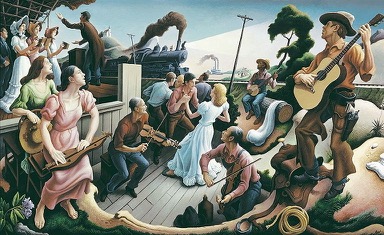MissedAppropriation

"I might most vehemently defend what was never really there at all."
We seem to hold many fallacies as self-evident truths. Even those who preach against the likelihood of physical evolution seem to hold social evolution as unimpeachable truth. We might not be descended from monkeys, but some (most prominently, themselves) sure seem clearly superior to others. They might even cite some behavioral psychology experiment performed on birds or dogs to justify human behavior, shrugging in acquiescence to what they might firmly believe to be immutable scientific fact while quietly discounting a raft of conflicting experimental results. They defend social status quos as god-given and progressive-minded change as the devil's own handiwork. I suppose, given random, entropy-infused experience, humans simply must project some sort of reassuring patterns onto the screen. Our projections seem drawn from simple models, side-stepping the more physically common exponential and logarithmic progressions, preferring straight-line addition of two and two over anticipating any point on a wave or curve. We fill ourselves with these fantasies and they quickly become our baseline realities.
What are we supposed to believe, anyway? Our premises seem under continual threat, with fresh studies and surprising experience endlessly bringing earlier conclusions into question. If we did not colonize these melting ice floes of certainty, we might feel as though we were going quietly insane. As a result, we behave as if we were genuinely insane. It might be that all conclusions prove to be nothing more than conjecture, and that we construct tenuous houses of cards to serve as our firm societal foundations. All things certainly do seem to fall apart. What was once clearly right seemed to evolve into an ever-emerging wrong. Our birthrights seem written in quill pen scratchings on crumbling parchment. Almost everything I learned in first grade eventually misled me. I've been unlearning since the day I was born.
In the early sixties, upstanding citizens would rush to defend their communities, feeling every bit the modern day Minute Men swarming to oppose an intruding evil. That obvious evil invaded their sacred lunch counter or picketed their local produce processing plant, insisting upon the probably communist-influenced idea of equal rights. Where did these pinkos get this radical idea? A liberal reading of our common constitution apparently renders our foundation subversive. A decent church-going citizen should violently defend what he'd come to know as his way of life. Many in the mob had failed to fit in going back to elementary school, as if that rendered them somehow special, ultimately banding together to defend a tenacious ignorance as their sole remaining freedom. Convinced that they were most certainly not descended from monkeys, they amplified their point by behaving as no lower-order primate ever would, bloodying blacks, Mexicans, and the reviled libral carpetbaggers from up north as acts of social grace.
Each society seems defined by its inner ignorance. We defend our misconceptions against the unwanted intrusions of degrading others. We seem more informed by what we do not want than by what we understand. We might understand that we understand little, that those clear scientific proofs were never more than well-informed speculation and tenaciously tied to rather specific conditions; hardly universal. The skepticism informing scientific inquiry seems to become wholly unwarranted certainty in the hands of those who have always struggled to feel as though they fit in. We wear our grudges on our lapels as crosses or American flags, and feel somehow more patriotic for this. Patriotism demands a patron, a wise father, an overseer judging our performances and contributions, whether in heaven or our White House. No patriot is ever free, but indentured to a most insidious form of voluntary slavery. The righteousness of the defenders seems indistinguishable from absolute evil.
I feel as though I'm making progress, though I understand in my deepest somewhere that everything I touch was always destined to eventually fall apart. I might revel in my advancements anyway, at least until I cannot revel in them anymore. In retrospect, my more innocent and ignorant times seem like a kind of heaven. The worst decision I ever made involved ignoring a strong intuition that I should walk my hometown's streets snapping pictures of every scene my upbringing had rendered mundane, to capture what I then knew so well that I felt a stronger pull to simply ignore what my guts screamed to me. I'd just graduated from high school and sensed that my life would soon undergo irredeemable changes, as if that made me special. Many times since, I've grieved over those lost scenes, the buildings razed by progress and fire, those businesses once foundational and now simply gone. They disappeared anyway, and I suppose that my strong positive memories are better served by the inaccurate smoothing only recollection can produce. That world did not feel like heaven to me then. I might most vehemently defend what was never really there at all.
©2019 by David A. Schmaltz - all rights reserved


